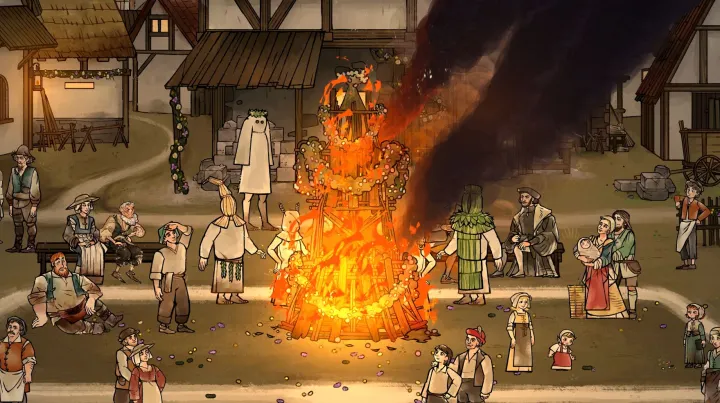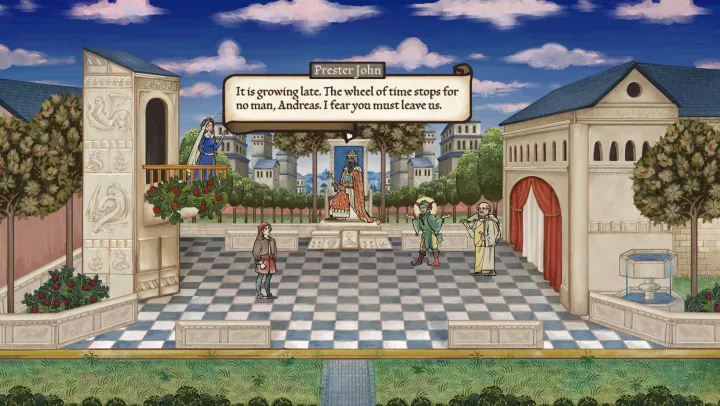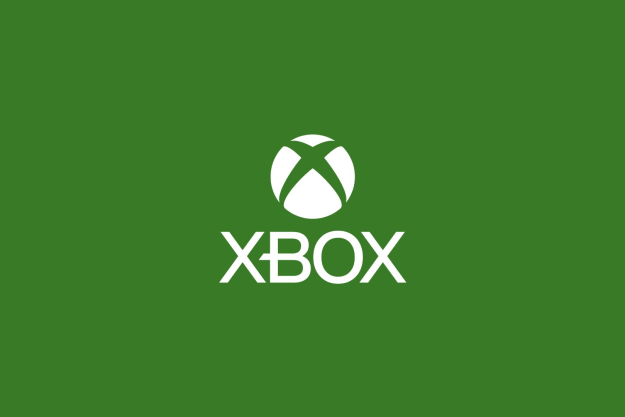At the end of Pentiment’s first act, I’m faced with a difficult choice. In order to save a dear friend who stands on public trial for murder and faces execution, I need to make an accusation of my own. Using leads I’ve found over the course of a few days, I present a flimsy case against a well-respected monk with occult ties. He’s beheaded in the town square as the townsfolk look on in horror. When I return to the town of Tassing years later, those same townsfolk give me a cold reception, shunning me for destroying their quiet way of life.
While choice can play a major role in many modern games, it matters more than usual in Pentiment. It isn’t just something that determines if its lead journeyman, Andreas Maler, is good or evil — each decision shapes the course of a small town’s history. To get that feeling just right, a tiny development team within RPG giant Obsidian Entertainment would need to dial in on what choices actually feel impactful in a game. According to Senior Producer Alec Frey, who sat down with Digital Trends ahead of the game’s launch, the secret to its success comes from a less is more approach.
“It’s about choices mattering, not about them being everywhere,” Frey says.
Lean team
Pentiment is a unique game due to its development history. The narrative adventure was a passion project for Fallout: New Vegas director Josh Sawyer, who wanted to create a historical game. Sawyer was inspired when he played indie titles like Night in the Woods and Mutazione and sought to make something in that 2D style. Frey explains how the idea for Pentiment came together when Sawyer and his team settled on a specific point in history that felt like a natural fit for a crime deduction story
“[Sawyer] came across this time period of 16th-century Bavaria, which is a really interesting time where the advent of the printing press is giving people access to more text,” Frey tells Digital Trends. “More people are learning to read and information is starting to be pushed out to more people, not unlike how the internet affected us in our generation. Looking at that time period and that area of the world, we thought, man, if we set a murder mystery and then some scandal in this area, and maybe pick some art styles from this era, we could come up with something cool.”

Despite being developed by a major studio, Pentiment had a tiny development team. In fact, it only consisted of four developers at first. That scaled up to eight before settling at 14 by the end of the game’s development. The team would begin by creating a one-hour prototype to get the feeling of movement down before starting to crack down on the full game’s approach to choice-driven gameplay.
While Obsidian is used to working with enormous teams, the much smaller approach had some positive impacts on the project. For one, it allowed team members to have a bigger individual impact on aspects of the game as one person could be responsible for an entire section. The biggest difference, however, came from the added flexibility that came from reducing red tape.
“A big part of being a smaller team is that the communication is so much simpler,” Frey says. “Not needing that overhead hierarchy of producers and managers to make sure everyone’s communicating, and just knowing you can trust your team members to trust another person to work that stuff out … It allowed us to pivot the game really quickly. If we had ideas or wanted to try something, that was something we could throw in our chat channel and everyone just does it.”
The small team approach gave Obsidian more agency when implementing development choices that would radically shape the game during its three-year development cycle. Funny enough, that process perfectly mirrors Pentiment itself, a game where players have to make impactful choices that’ll shape the course of history.
Change over time
I return to the death sentence I was responsible for issuing at the end of the game’s first act. In another game, that moment might be followed by a scene explaining whether I had found the right culprit or framed an innocent. That doesn’t happen in Pentiment. Instead, I’m left wondering if I had messed up as time moves on and the residents of Tassing are forced to carry on without one of their own. Frey explains that the decision to obscure the “solution” from players plays a key role in Pentiment’s approach to decisions.
“Josh thought it would be compelling to not talk about the rightness and wrongness of it,” Frey says. “It’s often more compelling to be like, we’re in a world here and making decisions, and those decisions have effects. It’s not about being right or wrong; it’s about what impact you have on the world.”
From there, the question was how to give players choices that actually felt like they mattered and weren’t simply quick morality checks. Obsidian is no stranger to that strain of gameplay thanks to its background in RPGs, but Pentiment would require a different approach. After all, player decisions weren’t just shaping Andreas, but the entire town of Tassing, permanently.

Frey says that the studio had one secret weapon on its hands: time. By creating a story that would span multiple decades, the team could actually show real ways that Tassing evolved over time rather than having to keep the world in a consistent explorable state like, say, The Outer Worlds. That would put the focus back on how decisions cause a ripple effect one generation later rather than drawing a player’s attention to right or wrong answers.
“Something we knew we were doing pretty quickly was making the game take place over a long time period,” Frey says. “The 25-year span is something that we were like, we want to tell the story of this town during a time of socio-political and religious change. It’s way easier to show that change when you have time to show it, because that’s the reality of what history is like. When we talked about choices and making them feel good, we were like, we have this thing we don’t normally have in games … we have 25 years. When you make a decision early on and you get someone executed in the first act because you accused them, in the second act that’ll come up again and someone will be like, ‘You killed my husband! I’m not going to help you with this!’ Feeling that as time progresses is something we wanted to make sure came through. How can this feel good seven or 18 years later?”
Less is more
What’s particularly notable about Pentiment and its approach to choice is how it works on a systems level. Decision-making is often imperceptible to the player, as seemingly mundane dialogue choices can end up impacting the story’s direction much later. That’s thanks in small part to the game’s persuasion system, which is its most RPG-like idea.
Anytime Andreas talks to a character, there are key moments that those NPCs are reacting to. A widow might remember that Andreas showed her kindness in Act 1, which in turn makes her trust him with some crucial information years later. In my playthrough, I accidentally alienated a group of Tassing residents in a tavern after I made a joke about how I was picking up the tab. Someone in the room saw it as rude and it came back to bite me later when I tried to shake them down for key information.
It’s not about being right or wrong; it’s about what impact you have on the world.
While the system is one of Pentiment’s most crucial choice systems, it didn’t come together until this year. Frey and the team had to rework it several times to make it feel less like a mathematically driven RPG system and more like an organic human interaction.
“We initially didn’t quite have the persuasion system,” Frey says. “That system probably got more iteration during development than any system in the game. When we started, we had global variables that we tracked anything on like any normal game. Then Josh proposed this persuasion system where there was a narrative mechanic where you could persuade people and we could make the player feel impact. We didn’t want this game to ever have numbers or RPG systems in that way. That system didn’t become what it is now until six or five months ago, and it was something we first put in the game almost two years ago.”
Those persuasion moments don’t happen often in Pentiment. I only experienced a handful of them in my playthrough, but anytime I failed one, I became hyper-aware of how much even my throwaway dialogue choices could have catastrophic consequences for Tassing. Frey notes that the less is more approach to these moments is the secret to the game’s success as a narrative adventure. It allows Obsidian to ensure that every decision is an important one.
“Something that we try to strive for isn’t that you have a million choices; it’s that there are a handful of compelling ones,” Frey says. “In Pentiment, you have a lot of choices throughout the game and you have choices within conversations, which have impacts on persuasion checks. But then we have these impactful ones at the end of the acts that hit you with ‘This is going to affect the rest of the game or the future of this town.’ We want you to feel that in a heavy way.”

Frey notes that the team leaned on the larger team at Obsidian to make sure they were on the right track — a helpful resource considering the company’s RPG expertise. They would toss builds of the game out to the company, which would send feedback about how important individual moments felt. If players were clicking through dialogue boxes without a second thought, it was back to the scriptorium to make that decision feel more thoughtful.
Without going into detail, Pentiment brings this idea home in its final act. A narrative shift has players making only a few choices, but they carry more weight than some of the game’s life-or-death ones. At the finale, my decisions will not just shape the lives of Tassing’s residents, but how the town itself will be remembered by history forever. Three seemingly low-stakes decisions become Pentiment’s most challenging ones, as they force me to think beyond the confines of the game’s 25-year timeline.
What will be Tassing’s legacy? The choice is yours.
Pentiment is out now on Xbox One, Xbox Series X/S, and PC. It’s available on Xbox Game Pass.
Editors' Recommendations
- Another Crab’s Treasure is an approachable Soulslike with a comedic twist
- Xbox games on PS5? It’s not as shocking as you think
- Obsidian’s massive action RPG Avowed finally launches this fall
- For Microsoft, indies aren’t Game Pass extras. They’re the future of Xbox
- Every blockbuster reveal from the Xbox leak: new consoles, Bethesda games, and more




